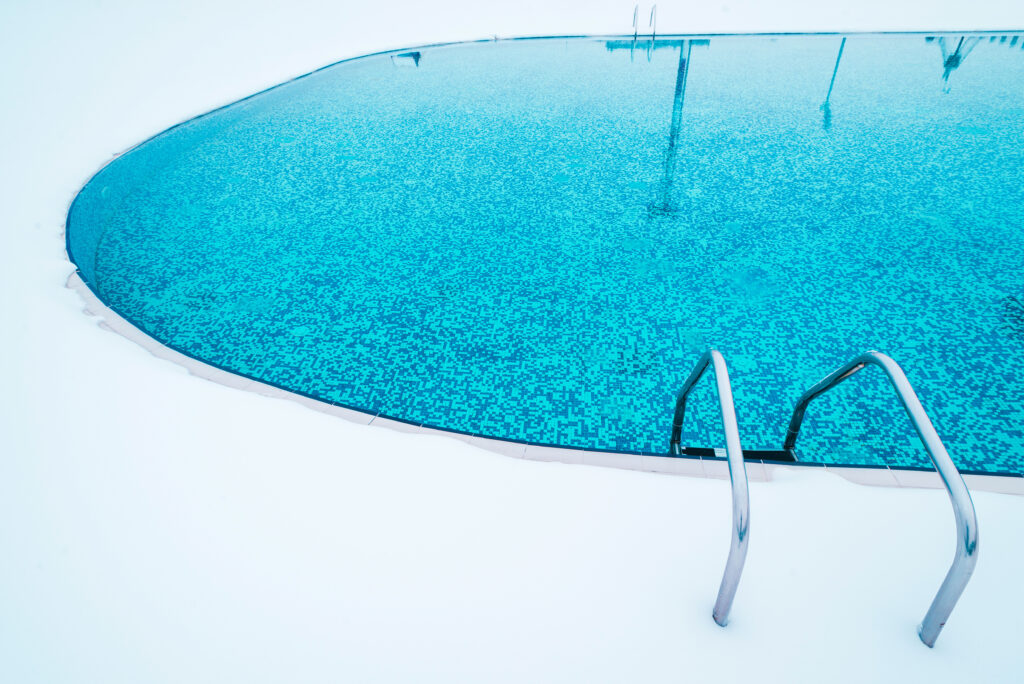Before winter weather fully arrives, make sure your pool is ready for snow and ice. Winter pool maintenance helps protect your oasis from harsh winter weather and water contamination. Plus, winter maintenance ensures a smooth reopening once spring arrives. Protect your investment with these winterization processes.
Winterizing Your Pool Before Snow and Ice Arrive
Harsh conditions can freeze your pool over and wreak some serious havoc if you haven’t taken the proper precautions. Here’s what you should be doing to get everything ready for winter weather.
1. Balance Your Water Chemistry
Most people choose not to drain their pools fully for the winter. You want to keep the water you’ve invested in and speed up the process of reopening your pool. But before you cover your pool for the winter, check the chemistry to prevent algae, bacteria and other contaminants.
Throughout the winter, check your pool chemistry every two months to keep it in good shape and ready for the upcoming swim season. Before spring, discard any leftover chemicals from the past year. With time, chemicals lose their potency and using them in your pool next season could cause great frustration and make you miss out on available swim days.
Add an enzyme product that will help prevent a waterline ring from forming this winter. That way, you won’t spend hours scrubbing the walls of your pool when you open it.
Be sure you run the filter for 12 hours once you’ve balanced your chemicals to allow them to circulate properly.
2. Turn Off the Heater
You don’t care about the water temperature of your pool during the winter months. Don’t waste money on heating your pool when it’s closed.
3. Remove Pool Accessories
Remove ladders, toys and other accessories from the pool before placing the cover over it. Store these items in a safe location, preferably inside a pool house or shed to offer some protection from the elements.
4. Clean the Pool
Spend some time removing debris and brushing the sides of the pool to loosen dirt and algae. Vacuum the floor as best you can. If you leave debris, algae and contaminants on the pool floor and sides all winter, it can create lasting damage.
5. Lower the Water Level
Once you’ve balanced and cleaned the pool, you’re ready to lower the water level. Talk with an expert about how low to go on your water level based on your pool’s characteristics. Most pools benefit from having the water below the mouth of the skimmer and return lines.
Lowering the water below the skimmer will help prevent water from freezing in the skimmer and causing problems over the winter. You can then add plastic dams to plug your skimmers.
Make sure you know what you’re doing when lowering your pool’s water level. Going too low and not matching the water level to the style of your pool could lead to damage.
6. Check Pipes for Excess Water
The last thing you want is a broken pipe when you go to open your pool in the spring. Check to make sure all excess water is removed from your pipes. And while you’re reviewing your pipes, ensure your pool pump and heater are working properly. You don’t want to discover that these items are not functioning when you go to open your pool.
You can run pool antifreeze through the lines to prevent any surprises. Start by blowing out the valves using an air compressor or reverse vacuum. Read the pool antifreeze instructions carefully and once you’ve winterized the lines, be sure to plug them all using winterizing plugs.
7. Install a Pool Cover
Pool covers protect your pool from harsh weather. That way, debris and animals can’t make their way inside. Ensure that your winter cover is secured firmly to your pool deck. Check to see that all safety components are in their place.
Regularly remove debris off the pool cover using a hose. Then vacuum up any water that’s standing on your pool cover.
After it snows, use a roof rake to remove snow from the pool cover to prevent damage. Snow is heavy and can weaken your pool cover. Try to remove the snow as quickly as possible after a storm to preserve your pool cover as long as possible.
8. Prevent Untreated Water from Entering the Pool
As snow melts, it can add untreated water to your winterized pool, which will unbalance your chemicals. The best way to prevent untreated water from entering your pool is to use a pool cover that keeps water out. Plus, removing snow on top of the pool cover will prevent the cover from giving way and allowing the untreated water to get inside.
Winterizing Pools in Middle Tennessee
Winter weather is on the way in middle Tennessee so be sure your pool is ready with complete winterization. Is this cold weather making you think about upgrading your backyard for next summer? Peek Pools & Spas is here to help. Call our team at 615-866-8800 or contact us now to get started!
